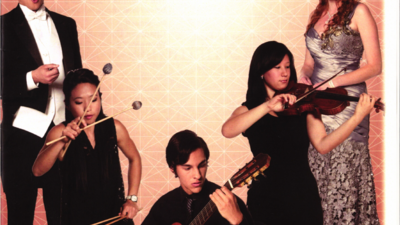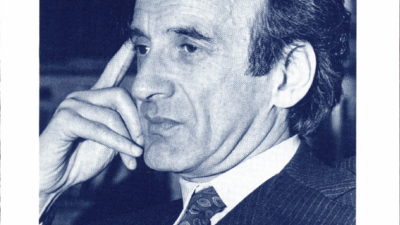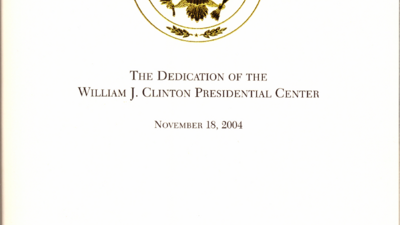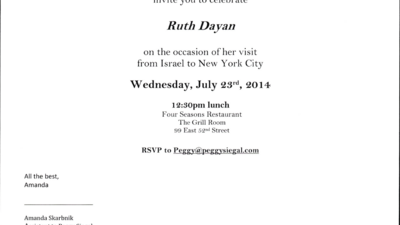Program of Remembrance for His Excellency Ariel Sharon, New York, 2014
Title
Date
Summary
This document is a program for a "Remembrance" event held on Wednesday, February 26, 2014, at the Fifth Avenue Synagogue in New York City, honoring the late Israeli Prime Minister Ariel Sharon. The program outlines a series of tributes, musical performances, and prayers. It includes segments such as a performance of "Kaddish," words of tribute from notable figures like Ambassador Ido Aharoni and Malcolm Hoenlein, and a rendition of Natan Alterman's poem "The Silver Platter." Personal reflections are offered by Professor Elie Wiesel, Gilad Sharon (Ariel Sharon's son), and Ira Rennert. The program also features memorial prayers, including the Mourner's Kaddish, Prayer for the State of Israel, and Hatikvah. Several prominent Jewish American organizations, alongside the Consulate General of Israel in New York, are listed as participating organizations. The document concludes with an invitation to a reception sponsored by Ingeborg and Ira Rennert, celebrating Sharon's life and legacy. Full texts of "The Silver Platter" and the Hebrew prayers are provided in both English and Hebrew.
More Sources Like This

This document is a program guide for the Fall 2014 season of the Chapman University College of Performing Arts, primarily featuring The Chapman Orchestra's concert on November 8, 2014. It includes detailed program notes on works by Sergei Prokofiev (Violin Concerto No. 1) and Ralph Vaughan Williams (Symphony No. 5), alongside biographies of conductor Daniel Alfred Wachs and violinist Chloé Tardif. The guide also provides a calendar of other performing arts events for Fall 2014, a listing of orchestra members and faculty, and an appeal for donations to the Fund for Excellence. A unique inclusion is a reproduced postcard from Sergei Prokofiev to Henri Temianka from 1932, highlighting the Temianka Endowed Scholarship. The document serves as both a program for specific concerts and a broader promotional and fundraising tool for the College of Performing Arts.

This document is a multi-page invitation and program for a dinner hosted by The National Committee on American Foreign Policy, held on May 7, 1987, at the St. Regis Roof in New York. The event honored Elie Wiesel, the 1986 Nobel Peace Prize Laureate. The document includes a biography of Elie Wiesel, detailing his early life in Romania, education at the Sorbonne, immigration to the United States, and his distinguished career as an author and professor, notably his writings on the Holocaust and his advocacy for human rights. It also lists the individuals and the organization inviting guests to the dinner, as well as the committee's leadership and founding information, established in 1974 to stimulate interest in American foreign policy.
of
Lola Krause
Lola Krause, née Miestschanimoff, was born March 1,1916, in Vitebsk, Belarus. Her father, a successful movie photographer, and her mother, an accomplished pianist from Latvia, were non-observant Soviet Jews. Lola studied music with her mother, learned German from her governess and attended public school in Vitebsk. Rejected by the local Soviet college because of her father’s upper-class status, she moved to Leningrad, studied engineering and worked in film and scientific instrument factories. She married in 1938 and a son was born in 1939.
She details the siege of Leningrad; German bombardment; disease; lack of food and all public services. Her husband died of starvation, her weight dropped to 60 pounds and at three years of age, her son weighed only seven-and-a-half pounds. When her factory was relocated to Samarkand in 1941, she traveled with her son in a cattle car for six weeks, stopping in Tashkent. There she met her uncle, a doctor, who insisted that the fragile child remain with him in the hospital. A year-and-a-half later, he joined her in Samarkand, where she worked until 1946. She married again and the family moved illicitly across European borders, living in Jewish Agency camps in Wroclaw (Breslau), Poland and at Waseralfinger, near Stuttgart, Germany. Another son was born and they survived with food packages from American relatives.
In 1949, Lola and her familyemigrated to the United States. Lola describes their adjustment in Bradley Beach, N.J. and in Philadelphia, working in factories and establishing their own cleaning business. She sold her valuable bracelet to buy a piano, suffering ridicule from poor neighbors, because she believed children had to learn to play an instrument. She had her sons circumcised, sent them to Hebrew school and began to observe Jewish holidays. A visit to Israel in 1972 further heightened her Jewish consciousness.

This document is the official program booklet for the dedication of the William J. Clinton Presidential Center on November 18, 2004. It outlines the full ceremony, including musical performances, remarks from various prominent figures such as former U.S. Presidents Bill Clinton, George H.W. Bush, and Jimmy Carter, as well as First Ladies Hillary Rodham Clinton, Laura Bush, Barbara Bush, and Rosalynn Carter. The program details the order of events, from fanfares and announcements to a presentation of the key to the library. Additionally, it features an extensive list of individuals and organizations who supported the dedication, acknowledging their contributions. Brief biographies of many participants, performers, and speakers are provided, often highlighting their connections to the Clinton administration's initiatives or personal interactions with President Clinton. The document concludes by listing the Board of Directors of the William J. Clinton Foundation.
of
Marian Filar
Born December 17, 1917 in Warsaw, Poland, Marian Filar was a member of a musical and religious Jewish family who became a child prodigy and a noted concert pianist and teacher. His father was a manufacturer and his grandfather was a rabbi. He studied at the Warsaw and Lemberg conservatories and graduated from Gymnasium in Warsaw. In September, 1939, he fled to Lemberg following the German invasion. After graduation from the Lemberg Conservatory in December, 1941, he rejoined his family in the Warsaw Ghetto. He worked with a labor group taken outside the ghetto to a railroad workplace in Warsaw West. He describes severe beatings by S.S. guards and his rescue by a Polish railway man. He details his solo performance and other symphony concerts in the ghetto by Jewish musicians, often playing music by forbidden composers. He mentions ghetto deportations, 1942-43, when his parents and siblings were taken.
In May, 1943, after the ghetto uprising, he was deported to Majdanek. After beatings and near-starvation, he volunteered for a labor camp in Skarzysko-Kamiena, where he received aid from a fellow worker who was Polish. Moved to Buchenwald in August 1944, he was housed in a tent camp with Leon Blum, Deladier and other prominent politicians and clerics. Mr. Filar was moved next, by train, to Schlieben, near Leipzig, to work in a bazooka factory, where a Polish kitchen maid gave him extra food. His piano playing impressed the German civilian camp supervisor who transferred him to an easy job to protect his hands. As the war front moved near, he was sent with other prisoners by train to Bautzen and then on a death march to Nicksdorf (Mikulasovice) in Czechoslovakia. He and two brothers survived and lived in Zeilsheim Displaced Person’s camp in Germany for two and a half years.
After liberation, he performed in concerts through Western Europe and toured Israel, playing with the Israeli Philharmonic during the war in 1956. He shares a moving vignette about going to Professor Walter Gieseking’s villa and auditioning to become his student. He studied with him for five years.He emigrated to the USA in 1950, where he played with many American orchestras, headed the piano department at Settlement Music School in Philadelphia, and joined the faculty at Temple University. After retirement, he taught privately and judged international piano competitions.

This document is an email invitation sent by Amanda Skarbnik, Assistant to Peggy Siegal, on Tuesday, July 22, 2014, to Leslie Meyers. The invitation is from Amalia Dayan, Rula Jebreal, and Peggy Siegal, inviting the recipient to a lunch celebrating Ruth Dayan. The event is scheduled for Wednesday, July 23rd, 2014, at 12:30 PM, at The Grill Room, Four Seasons Restaurant, located at 99 East 52nd Street in New York City. The lunch is held on the occasion of Ruth Dayan's visit from Israel to New York City. Guests are requested to RSVP to Peggy Siegal's email address. The email includes Amanda Skarbnik's contact information and the address of the Peggy Siegal Company in New York, NY.